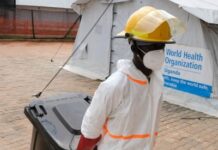In a media briefing on Tuesday, WHO Director-General Tedros Adhanom Ghebreyesus highlighted the consequences of funding suspensions, including disruptions to HIV treatment, setbacks in polio eradication and limited resources for responding to mpox epidemics in Africa.
Health workers wearing protective clothing in Uganda.
“At most, only one-third of people who need health services in North and South Kivu are able to receive them,” Tedros stated, emphasising the risks posed by infectious disease outbreaks such as mpox and cholera.
Supplies, including medicines and fuel, are running critically low, further complicating WHO’s ability to respond.
Advancing childhood cancer treatment
On a more positive note and as UN News reported on Tuesday, WHO announced progress in expanding access to childhood cancer medicines in low and middle-income countries.
“Yesterday, we began distributing childhood cancer medicines at no cost in the first two countries: Mongolia and Uzbekistan,” said Tedros, adding that shipments are planned for four more countries.
The programme is facilitated through the Global Initiative on Childhood Cancer, launched in partnership with St. Jude Children’s Research Hospital.
The initiative aims to reach 120,000 children across 50 countries over the next five to seven years, addressing stark disparities in survival rates between high-income and low-income nations.






























